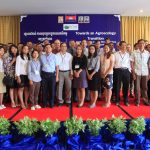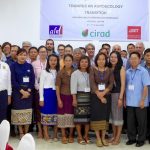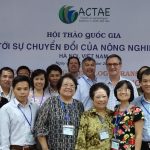Layout:
Showing 831-840 of 1007
-
Habitat eradication and cropland intensification may reduce parasitoid diversity and natural pest control services in annual crop fields
Title of document: Habitat eradication and cropland intensification may reduce parasitoid diversity and natural pest control services in annual crop fields Authors: Deborah K. Letourneau; Sara G. Bothwell Allen; Robert R. Kula; Michael J. Sharkey; John O. Stireman Ministry/Government Agency/Organisation: Science of the Anthropocene Year of publication: 2015 Geographic focus: USA Url original document: elementascience.org Summary: Ecosystem services, through vital for the future of U.S. agricultural production and profitability are several threatened by agricultural intensification. Pollinator declines, persistent crop losses from pests, increase crop and water contamination and variable climate effects on project food production have prompted major research and policy initiatives in the U.S. and Europe targeting sustainable crop production and biodiversity conservation. Read MoreGRET2015 1 download
-
Audit and agrarianism: the moral economy of an alternative food network
Title of document: Audit and agrarianism: the moral economy of an alternative food network Authors: Liz Carlisle Ministry/Government Agency/Organisation: Science of the Anthropocene Year of publication: 2015 Geographic focus: Global Url original document: elementascience.org Summary: With consumers and producers seeking alternative to corporate, industrial food, systems of provision that promise greater ecological and social sustainability have gained in popularity. As these Alternative Food Networks (AFNs) scale up and go mainstream, both scholars and the general public want to know who is holding them accountable to their purported goals. Read MoreGRET2015 2 downloads
-
The Farming Systems Trial
Title of document: The Farming Systems Trial Authors: Rodale Institute Ministry/Government Agency/Organisation: Rodale Institute Year of publication: Geographic focus: Global Url original document: www.rodaleinstitute.org Summary: The hallmark of a truly sustainable system is its ability to generate itself. When it comes to farming, the key to sustainable agriculture is healthy soil, since it is a foundation for present and future growth. Organic farming is far superior to conventional systems when it comes to building, maintaining and replenishing the health of soil. For soil health alone, organic agriculture is more sustainable than conventional. When one also considers yields, economic viability, energy usage, and human health, it is clear that organic farming is sustainable, while current conventional practices are not. Read MoreGRET2015 8 downloads
-
 Profiles of participants attending the multi stakeholder workshops on agroecological transition in the Mekong Region
Title of document: Profiles of participants attending the multi stakeholder workshops on agroecological transition in the Mekong Region Authors: ALiSEA Team Ministry/Government Agency/Organisation: ALiSEA Year of publication: 2016 Geographic focus: Cambodia, Laos, Myanmar & Vietnam Summary: These 4 documents compile short biographies and contact details of most of the participants who have attended the 4 national multi-stakeholder workshops addressing Agroecological Transition in the Mekong Region organized between March and June 2016 (Myanmar, Cambodia, Vietnam Lao PDR). Read MorePierre Ferrand 24 downloads
Profiles of participants attending the multi stakeholder workshops on agroecological transition in the Mekong Region
Title of document: Profiles of participants attending the multi stakeholder workshops on agroecological transition in the Mekong Region Authors: ALiSEA Team Ministry/Government Agency/Organisation: ALiSEA Year of publication: 2016 Geographic focus: Cambodia, Laos, Myanmar & Vietnam Summary: These 4 documents compile short biographies and contact details of most of the participants who have attended the 4 national multi-stakeholder workshops addressing Agroecological Transition in the Mekong Region organized between March and June 2016 (Myanmar, Cambodia, Vietnam Lao PDR). Read MorePierre Ferrand 24 downloads -
 Consolidated account of the 4 national multi stakeholder workshops on agroecological transition in the Mekong Region
Title of document: Consolidated account of the 4 national multi stakeholder workshops on agroecological transition in the Mekong Region Authors: Pierre Ferrand Ministry/Government Agency/Organisation: ALiSEA Year of publication: 2016 Geographic focus: Cambodia, Laos, Myanmar & Vietnam Summary: This report presents a short consolidated account of 4 national multi-stakeholder workshops addressing Agroecological Transition in the Mekong Region and bringing together 225 participants that have been organized between March and June 2016 (Myanmar, Cambodia, Vietnam Lao PDR). Such workshops aimed at sharing knowledge, information and actions between agricultural development stakeholders. Read MorePierre Ferrand 29 downloads
Consolidated account of the 4 national multi stakeholder workshops on agroecological transition in the Mekong Region
Title of document: Consolidated account of the 4 national multi stakeholder workshops on agroecological transition in the Mekong Region Authors: Pierre Ferrand Ministry/Government Agency/Organisation: ALiSEA Year of publication: 2016 Geographic focus: Cambodia, Laos, Myanmar & Vietnam Summary: This report presents a short consolidated account of 4 national multi-stakeholder workshops addressing Agroecological Transition in the Mekong Region and bringing together 225 participants that have been organized between March and June 2016 (Myanmar, Cambodia, Vietnam Lao PDR). Such workshops aimed at sharing knowledge, information and actions between agricultural development stakeholders. Read MorePierre Ferrand 29 downloads -
Strategic Plan of Action on ASEAN Cooperation in Crop (2016-2020)
Title of document: Strategic Plan of Action on ASEAN Cooperation in Crop (2016-2020) Authors: ONG Keng Ho Ministry/Government Agency/Organisation: ASEAN Year of publication: 7/3/2014 Geographic focus: ASEAN Url original document: http://asean-agrifood.org/wp-content/uploads/2014/12/Strategic-plan-for-ASEAN-working-on-Crop_140718-report.crops_.pdf Summary: The purpose of this is to assist agriculture industries and natural resources division in deveoping the objectives, goals, strategies of the ASEAN 5 years (2016-2010) Strategic Plan of Action (SPA) for crop sector and in providing recommendations to enhance and facilitate the implementation of this 2016-2010 SPA. Read MoreGRET2015 11 downloads
-
Organic Agriculture and Post 2015 Development Goals
Title of document: Organic Agriculture and Post 2015 Development Goals: building on the comparative advantage of poor farmers Authors: Sununtar Setboonsarng, Anil Markandya & al. Ministry/Government Agency/Organisation: ADB Year of publication: 2015 Geographic focus: South East Asia Url original document: http://www.adb.org/publications/organic-agriculture-and-post-2015-development-goals Summary: The book makes an evidence-based case for organic agriculture in developing countries, particularly those in Southeast Asia. It starts by examining the data from organic agriculture farms, comparing them with those from nonorganic agriculture farms to see what can be said about the effects of organic agriculture on the livelihoods of comparable people and in terms of the MDGs (Chapters 1, 8, and 9). The book then goes on to look at the economic dimension of promoting organic agriculture and actual experiences in implementing it. It explores the following questions: Are the benefits of such programs justified in terms of their costs (Chapter 2)? Does certification help farmers in terms of increased incomes for their products (Chapter 3)? How well has certification worked to increase incomes and livelihoods in particular cases (Chapter 4)? Which benefits motivate farmers to adopt organic agriculture (Chapter 5)? (This is important as a guide to which policies to use to promote the practice.) Is organic agriculture the best way to improve rural livelihoods, or can we do better through other interventions, such as promoting biofuels (Chapter 6)? What are the macroeconomic impacts of promoting organic agriculture (Chapter 7)? Following these chapters, the book looks at evidence on some of the big environmental questions related to sustainable agriculture. The first is its role in sequestering carbon, a major issue given the threats we face from climate change (Chapter 11). A second is enhancing biodiversity and preventing the loss of genetic material (Chapter 12). Finally, the book considers some of the big issues in the debate surrounding agriculture which touch on organic agriculture in developing countries. One deals with the environmental costs of shipping agricultural products over large distances (food miles, Chapter 13). Another is whether organic agriculture does indeed lower yields and thereby reduce our capacity to feed the growing population of the planet (Chapter 14). Read MoreGRET2015 21 downloads
-
 Proceeding of the National Workshop on Agroecology Transition in Laos
Title of document: Proceeding of the National Workshop on Agroecology Transition in Lao PDR Authors: Pierre Ferrand and Dr. Saythong Vilayvong Ministry/Government Agency/Organisation: ALiSEA Year of publication: 2016 Geographic focus: Laos Url original document: Summary: This report presents the main findings of the discussions held during the 2 days workshop addressing the agroecology transition in Vientiane, Laos on the 2nd and 3rd of June 2016. Read MoreGRET2015 38 downloads
Proceeding of the National Workshop on Agroecology Transition in Laos
Title of document: Proceeding of the National Workshop on Agroecology Transition in Lao PDR Authors: Pierre Ferrand and Dr. Saythong Vilayvong Ministry/Government Agency/Organisation: ALiSEA Year of publication: 2016 Geographic focus: Laos Url original document: Summary: This report presents the main findings of the discussions held during the 2 days workshop addressing the agroecology transition in Vientiane, Laos on the 2nd and 3rd of June 2016. Read MoreGRET2015 38 downloads -
 Proceeding of the National Workshop on Agroecology Transition in Vietnam
Title of document: Proceeding of the National Workshop on Agroecology Transition in Vietnam Authors: Dr. Htet Kyu and Pierre Ferrand Ministry/Government Agency/Organisation: ALiSEA Year of publication: 2016 Geographic focus: Vietnam Url original document: Summary: This report presents the main findings of the discussions held during the 2 days workshop addressing the agroecology transition in Hanoi, Vietnam on the 5th and 6th of May 2016. Read MoreGRET2015 22 downloads
Proceeding of the National Workshop on Agroecology Transition in Vietnam
Title of document: Proceeding of the National Workshop on Agroecology Transition in Vietnam Authors: Dr. Htet Kyu and Pierre Ferrand Ministry/Government Agency/Organisation: ALiSEA Year of publication: 2016 Geographic focus: Vietnam Url original document: Summary: This report presents the main findings of the discussions held during the 2 days workshop addressing the agroecology transition in Hanoi, Vietnam on the 5th and 6th of May 2016. Read MoreGRET2015 22 downloads -
Building Farmers’ Capacity for Innovation Generation: What are the determining Factors
Title of document: Building Farmers’ Capacity for Innovation Generation: What are the determining Factors Authors: Justice A. Tamboo and Tobias Wunscher Ministry/Government Agency/Organisation: Center for Development Research, University of Bonn Year of publication: 2014 Geographic focus: Ghana Url original document: http://econpapers.repec.org/paper/agsaesc14/170351.htm Summary: While farmers have been recognised as one of the key sources of innovation, many studies on agricultural innovations continue to consider farmers as adopters of externally driven innovations only. Based on cross-sectional data from 409 farm households, this study, in contrast, analysis the innovation-generating behaviour among rural farmers in northern Ghana. Inspired by two innovation theories – induced innovation and innovation systems we focus on the determinants of innovation behaviour. Employing recursive bivariate probit and endogennous treatment regression models which control for selection bias, we find that participation in Farmer Field Fora, a participatory extension approach with elements of innovation systems perspective, is a key determinant of innovation behaviour in farm housholds. Other important determinants are education, climate shocks and risk preferences. These results are robults to alternative specifications and estimation techiques. Read MoreGRET2015 2 downloads
« Previous
1 2 3 4 5 6 7 8 9 10 11 12 13 14 15 16 17 18 19 20 21 22 23 24 25 26 27 28 29 30 31 32 33 34 35 36 37 38 39 40 41 42 43 44 45 46 47 48 49 50 51 52 53 54 55 56 57 58 59 60 61 62 63 64 65 66 67 68 69 70 71 72 73 74 75 76 77 78 79 80 81 82 83 84 85 86 87 88 89 90 91 92 93 94 95 96 97 98 99 100 101 Next »

 Asia & Mekong Region
Asia & Mekong Region  Cambodia
Cambodia  Laos
Laos  Myanmar
Myanmar  Other
Other  Vietnam
Vietnam